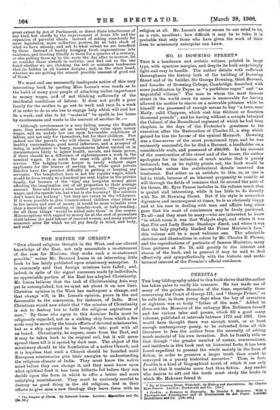PERDITA.t
THE long bibliography added to this book shows that the author has taken pains to verify his romance. He has made use of many of the private Memoirs of the time, especially those concerning the Court of George IH., and "George Prince," as be calls him, in those young days when the boy of seventeen or eighteen was so truly 'father of the man." Added to these are the Memoirs of the unhappy Mrs. Robinson herself and her various tales and poems, which fill a good many volumes, published at intervals between .1775 and 1801. One would have thought there was enough truth, or at least enough contemporary gossip, to be extracted from all this literature to free the author from the necessity of adding much material of his own invention. But he frankly tells us that though "the greater number 'of -scenes, conversations, and incidents in this book rest on historical facts, it has been found expedient to present the whole mainly in the form of fiction, in order to preserve a larger truth than' could be conveyed in a purely historical narrative." Thus, in fact, Perdita is a kind of biographical novel, of which it can only be said that it contains more fact than fiction. Any reader who desires to sift out the truth must study the books in which Mr. Makower found it.
• No. 10 Downing Streak Whitehall: its History and Associations. By Charles Eyre Pascoe. London Duckworth and Co. [21s.] Perdita : a Romance is Biography. By Stanley V. Kakower. With a Photogravure Frontispiece and 16 Illustrations an Art Paper. London* Hutchinson and Co. [16s. net.J • Such an arrangement will not, we think, be found altogether satisfactory by those who care for a real Life of a real person ; a person, too, of interesting character, considerable talent, and romantic experience, such as that beautiful Mary Darby who married Mr. Robinson, who was painted by Gainsborough, Sir Joshua Reynolds, Romney, Zoffany, West, Cosway—we all know her handsome, discontented face as she sits in the Wallace Collection with her dog beside her, as well as the grave sweetness of the later picture with cap and muff—who was a favourite pupil of Garrick, and as the enchanting heroine of A Winter's Tale captured the young heart of a most unworthy Florizel. The career of such a woman has an interest of its own which might, one would think, make her story inde- pendent of the embellishments of invention. However, the book that lies before us will certainly appeal to all novel. readers as well as to the smaller public which prefers its history and biography unspiced by imagination.











































 Previous page
Previous page